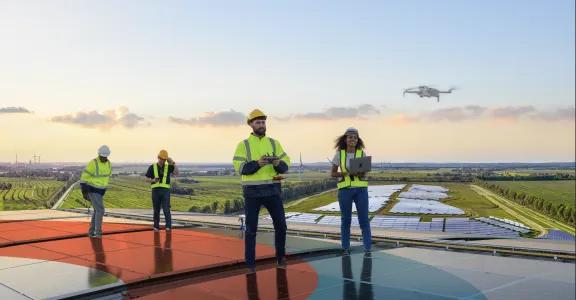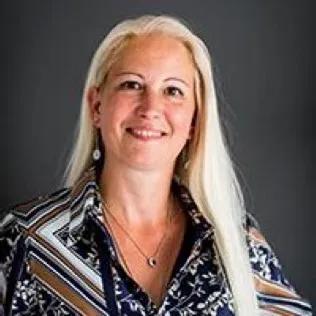"Eco can be a way of standing out."
With the Make The Future programme, Agoria and Sirris guide businesses step by step towards recognition as a Factory of the Future. This journey focuses on seven transformations that are essential for this recognition. In this interview series, we shed light on each transformation together with one or more expert(s) in the field. This time, Isabel Zaghet, Environment & Climate Policy Building Technology expert, and Veerle Van Steen, Environment expert at Agoria, talk about the transformation to an ‘Eco Factory’.
Hello Isabel and Veerle. What exactly does the ‘Eco Factory’ transformation involve?
Veerle: In the journey towards becoming a Factory of the Future, we notice that companies’ thoughts soon turn towards digitalisation or production system optimisation. Sustainability is sometimes overlooked. Our aim is to help businesses take steps in this direction by making them familiar with the (often many) European rules and sustainability practices.
Isabel: An ‘Eco Factory’ is a business that is concerned about the living environment, a business that strives to develop sustainably. This goes further than saving energy or reducing waste. Think for instance of reusing raw materials, sustainable packaging materials or using renewable energy. It covers the entire chain: from supplying primary materials, energy consumption and waste management to every aspect of the regulations and circular processes.
Businesses that invest in the eco-transformation not only become more sustainable, but often more efficient and more competitive, too.
Isabel Zaghet, Environment & Climate Policy Building Technology Expert at Agoria
How does a company start with this transformation?
Veerle: We have developed an assessment system that businesses can use to measure their sustainability performance. It’s simple: you fill in your scores for indicators such as energy consumption, waste management or the use of circular materials. This gives you an idea of where you stand and what you can do next.
Businesses that are unsure about their use of materials or compliance with the law, for instance, receive customised assistance from us, whether they are SMEs or multinationals. For example, we offer workshops on waste reduction or circular packaging or an insight into sustainability practices.
Practical examples:
- Reducing waste: A company noticed that it was wasting a lot of material during production. Better quality controls allowed them to produce less scrap.
- Saving energy: A metal company installed a heat pump to reuse residual heat. Result: lower costs and a fall in CO2 emissions.
- Improving packaging: An SME asked its supplier to make packaging reusable. This not only benefited the environment. It also strengthened the customer relationship.
By exchanging experiences and working together, companies can make progress more quickly.
Isabel: Within the Eco transformation, we use seven indicators, such as energy autonomy and the use of raw materials. In practical terms: “How autonomous is a company in terms of its energy supply?”, “How can it use fewer raw materials?”, etc. Every step taken is a good thing, in any case. Every company, from SMEs to multinationals, can go further than the legal requirements at its own level.
An: SME will focus on other topics than a multinational that has bigger budgets available. However, even small companies have to dare to go to a supplier to see whether packaging materials can be used in a more environmentally friendly way.
When a company thinks it reaches at least level 4 for each of the seven indicators, it can request to be considered for recognition as a Factory of the Future. We then carry out an audit, for which experts visit the company. The audit report will list the company’s strong points and also the areas in need of improvement. We share our knowledge and make recommendations. Of course, it is up to the company in question to take this further.
What role does technology play here?
Veerle: Although technology is less central to this transformation, measuring instruments and process optimisation are essential. We always start by measuring: water consumption, energy consumption and use of raw materials. These data form the basis for concrete improvement goals.
For example:
- Water consumption: the aim, of course, is for companies to reuse as much water as possible. Companies that wish to go a step further will try to close the water consumption loop in order to use as little mains or ground water as possible.
Energy consumption: Here again, seeing how much energy you use and eliminating energy losses is the minimum. For example, an ‘Eco Factory’ is expected to check whether it can recover heat from appliances or even use a wind turbine so that it can move away from conventional fossil fuels for its energy supply.
To be able to reduce the consumption of raw materials, water or energy, you naturally first need to know how much you use. Then you can set targeted goals or KPIs for certain installations or production lines. These goals help you as a company to make progress as regards the environment.
What are the benefits of transforming to become an ‘Eco Factory’?
Isabel: An ‘Eco Factory’ benefits from lower costs, greater efficiency and a stronger market position. Think, for instance, of companies that produce less waste and save on costs thanks to smarter use of materials. Companies that have grasped this principle will keep on looking for improvements, even if they have to invest first. After all, they know that the investment will pay off in the medium or long term.
Veerle: And don’t forget about the company's image! Young talents are attaching ever greater importance to sustainability when choosing their employer. Customers appreciate sustainability more and more. Companies that anchor sustainability in their strategy make themselves more attractive to the labour market and to customers. It really can be a decisive competitive advantage.
Young talents are attaching ever greater importance to sustainability when choosing their employer. Customers, too, appreciate sustainability more and more. Companies that anchor sustainability in their strategy make themselves more attractive to the labour market and to customers.
Veerle Van Steen, Environment Expert at Agoria
What challenges do businesses face?
Isabel: Many businesses have their hands full with day-to-day challenges, such as staff shortages or international competition. So sustainability often seems a step too far. But ultimately, deferring the issue can lead to higher costs and more complex problems. That’s why it is important to integrate eco-thinking directly into the corporate strategy. Because don’t forget, ‘eco’ is not just ‘eco’. It's about people, environments, and ensuring that everything is operational. So we work transversally with other transformations and offer guidance in a wide range of areas.
Is it difficult to make businesses enthusiastic about this transformation?
Veerle: Luckily we are seeing that over the last few years, sustainability has moved steadily up the agenda. Whereas in the past it was a side issue, now it is often one of the main points in audits. When we go along to companies now, we realise how far some of them have come, not because they have to but rather because they are convinced it is the right thing to do. That is a positive development which we are very pleased to see.
Read about the other transformations of the Make The Future programme:
Make the Future: Your Pathway to a Factory of the Future >
Transforming to Digital Factory >
Ready to take the first step towards becoming a Factory of the Future?
The Make the Future program is open to all manufacturing companies that are members of Agoria or Sirris. Wondering where your company stands? Book a no-obligation evaluation to assess your business’s current maturity level. You’ll receive a detailed report packed with actionable insights to speed up your transformation. And the best part? It’s free for members of Agoria and Sirris.
Find out how Make the Future can help your business thrive Book a no-obligation evaluation




